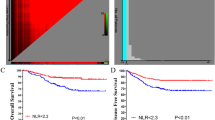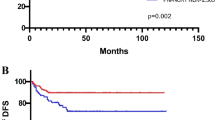Abstract
Background
The link between the blood count and a systemic inflammatory response (SIR) is indisputable and well described. Pretreatment hematological parameters may predict the overall clinical outcomes in many types of cancer. Thus, this study aims to systematically evaluate the relationship between baseline blood count levels and treatment response in rectal cancer patients treated with neoadjuvant chemoradiotherapy.
Patients and methods
From 2009–2015, 173 patients with locally advanced rectal cancer were retrospectively enrolled in the study and analyzed. The baseline blood count was recorded in all patients 1 week before chemoradiation. Tumor response was evaluated through pathologic findings. Blood count levels which included RBC (red blood cells), Hb (hemoglobin), PLT (platelet count), neutrophil count, WBC (white blood cells), NLR (neutrophil-to-lymphocyte ratio), and PLR (platelet-to-lymphocyte ratio) were analyzed in relation to tumor downstaging, pCR (pathologic complete response), OS (overall survival), and DFS (disease-free survival).
Results
Hb levels were associated with a response in logistic regression analysis: pCR (p = 0.05; OR 1.04, 95 % CI 1.00–1.07); T downstaging (p = 0.006; OR 1.03, 95 % CI 1.01–1.05); N downstaging (p = 0.09; OR 1.02, 95 % CI 1.00–1.04); T or N downstaging (p = 0.007; OR 1.04, 95 % CI 1.01–1.07); T and N downstaging (p = 0.02; OR 1.02, 95 % CI 1.00–1.04); Hb and RBC were the most significant parameters influencing OS; PLT was a negative prognostic factor for OS and DFS (p = 0.008 for OS); an NLR value of 2.8 was associated with the greatest significance for OS (p = 0.03) and primary tumor downstaging (p = 0.02).
Conclusion
Knowledge of pretreatment hematological parameters appears to be an important prognostic factor in patients with rectal carcinoma.
Zusammenfassung
Hintergrund
Die Verbindung zwischen dem Blutbild und der systemischen Entzündungsreaktion („systemic inflammatory response“, SIR) ist unbestreitbar und gut beschrieben. Aufgrund der prätherapeutischen Blutparameter ist bei vielen Krebsarten das klinische Gesamtergebnis nach Therapie möglicherweise voraussagbar. Ziel dieser Studie ist die systematische Bewertung der Beziehung zwischen den Ausgangswerten im Blutbild und dem Therapieerfolg bei Patienten mit Rektumkarzinom, die präoperativ mit Radiochemotherapie behandelt wurden.
Patienten und Methoden
Zwischen den Jahren 2009 und 2015 wurden die Daten von insgesamt 173 Patienten mit lokal fortgeschrittenem Rektumkarzinom retrospektiv analysiert. Das Ausgangsblutbild wurde bei allen Patienten eine Woche vor dem Beginn der Radiochemotherapie erstellt. Die Tumorantwort wurde anhand der pathologischen Veränderungen ermittelt. Die zellulären Blutbestandteile wie Erythrozyten („red blood cells“, RBC), Leukozyten („white blood cells“, WBC), Thrombozyten („platelets“, PLT) und weitere Parameter wie Hämoglobin (Hb), der Neutrophilen-Lymphozyten-Quotient („neutrophil-to-lymphocyte ratio“, NLR) und der Thrombozyten-Lymphozyten-Quotient („platelet-to-lymphocyte ratio“, PLR) wurden im Zusammenhang mit Tumor-Downstaging, pathologisch kompletter Remission („pathologic complete response“, pCR), dem Gesamtüberleben („overall survival“, OS) und rezidivfreiem Überleben („disease-free survival“, DFS) analysiert.
Ergebnisse
Der Hb-Wert und das Ansprechen auf die Therapie wurde anhand der logistischen Regressionsanalyse in einen Zusammenhang gestellt: pCR (p = 0,05; OR: 1,04; 95 %-KI: 1,00–1,07); T‑Downstaging (p = 0,006; OR: 1,03; 95 %-KI: 1,01–1,05); N‑Downstaging (p = 0,09; OR: 1,02; 95 %-KI: 1,00–1,04); T‑ oder N‑Downstaging (p = 0,007; OR: 1,04; 95 %-KI: 1,01–1,07); T‑ und N‑Downstaging (p = 0,02; OR: 1,02; 95 %-KI: 1,00–1,04); Hämoglobin und RBC waren die Parameter mit dem stärksten Einfluss auf das OS; die Thrombozytenzahl war ein negativer prognostischer Faktor für das OS und DFS (p = 0,008 für OS); ein NLR-Wert von 2,8 wies die größte Signifikanz für das OS (p = 0,03) und ein Tumor-Downstaging des primären Tumors auf (p = 0,02).
Schlussfolgerungen
Die Kenntnis der prätherapeutischen hämatologischen Parameter scheint einen wichtigen prognostischen Faktor für Patienten mit Rektumkarzinom darzustellen.


Similar content being viewed by others
References
Balkwill F, Mantovani A (2001) Inflammation and cancer: back to Virchow? Lancet 357(9255):539–545
Mantovani A, Allavena P, Sica A, Balkwill F (2008) Cancer-related inflammation. Nature 454(7203):436–444
McMillan DC (2009) Systemic inflammation, nutritional status and survival in patients with cancer. Curr Opin Clin Nutr Metab Care 12(3):223–226
American College of Chest Physicians, Society of Critical Care Medicine (1992) American college of chest physicians/society of critical care medicine consensus conference: definitions for sepsis and organ failure and guidelines for the use of innovative therapies in sepsis. Crit Care Med 20(6):864–874
Roxburgh CS, McMillan DC (2010) Role of systemic inflammatory response in predicting survival in patients with primary operable cancer. Future Oncol 6(1):149–163
McMillan DC (2013) The systemic inflammation-based Glasgow prognostic score: a decade of experience in patients with cancer. Cancer Treat Rev 39(5):534–540
Choi KW, Hong SW, Chang YG, Lee WY, Lee B, Paik IW, Lee H (2014) Inflammation-based score (Glasgow prognostic score) as an independent prognostic factor in colorectal cancer patients. Ann Surg Treat Res 86(6):309–313
Lee SD, Park JW, Park KS, Lim SB, Chang HJ, Kim DY, Jeong SY, Choi HS, Oh JH (2009) Influence of anemia on tumor response to preoperative chemoradiotherapy for locally advanced rectal cancer. Int J Colorectal Dis 24(12):1451–1458
Carruthers R, Tho LM, Brown J, Kakumanu S, McCartney E, McDonald AC (2012) Systemic inflammatory response is a predictor of outcome in patients undergoing preoperative chemoradiation for locally advanced rectal cancer. Colorectal Dis 14(10):e701–707
Kawai K, Kitayama J, Tsuno NH, Sunami E, Watanabe T (2013) Thrombocytosis before pre-operative chemoradiotherapy predicts poor response and shorter local recurrence-free survival in rectal cancer. Int J Colorectal Dis 28(4):527–535
Coussens LM, Werb Z (2002) Inflammation and cancer. Nature 420(6917):860–867
Terzic J, Grivennikov S, Karin E, Karin M (2010) Inflammation and colon cancer. Gastroenterology 138(6):2101–2114
Pernot S, Terme M, Voron T, Colussi O, Marcheteau E, Tartour E, Taieb J (2014) Colorectal cancer and immunity: what we know and perspectives. World J Gastroenterol 20(14):3738–3750
Proctor MJ, McMillan DC, Morrison DS, Fletcher CD, Horgan PG, Clarke SJ (2012) A derived neutrophil to lymphocyte ratio predicts survival in patients with cancer. Br J Cancer 107(4):695–699
Templeton AJ, McNamara MG, Seruga B, Vera-Badillo FE, Aneja P, Ocana A, Leibowitz-Amit R, Sonpavde G, Knox JJ, Tran B, Tannock IF, Amir E (2014) Prognostic role of neutrophil-to-lymphocyte ratio in solid tumors: a systematic review and meta-analysis. J Natl Cancer Inst 106(6):dju124
Guthrie GJ, Charles KA, Roxburgh CS, Horgan PG, McMillan DC, Clarke SJ (2013) The systemic inflammation-based neutrophil-lymphocyte ratio: experience in patients with cancer. Crit Rev Oncol Hematol 88(1):218–230
Dvorak J, Sitorova V, Ryska A, Sirak I, Richter I, Hatlova J, Ferko A, Melichar B, Petera J (2012) Prognostic significance of changes of tumor epidermal growth factor receptor expression after neoadjuvant chemoradiation in patients with rectal adenocarcinoma. Strahlenther Onkol 188(9):833–838
Kumar P (2000) Impact of anemia in patients with head and neck cancer. Oncologist 5(Suppl 2):13–18
Grogan M, Thomas GM, Melamed I, Wong FL, Pearcey RG, Joseph PK, Portelance L, Crook J, Jones KD (1999) The importance of hemoglobin levels during radiotherapy for carcinoma of the cervix. Cancer 86(8):1528–1536
Khan AA, Klonizakis M, Shabaan A, Glynne-Jones R (2013) Association between pretreatment haemoglobin levels and morphometric characteristics of the tumour, response to neoadjuvant treatment and long-term outcomes in patients with locally advanced rectal cancers. Colorectal Dis 15(10):1232–1237
Zhang F, Cheng F, Cao L, Wang S, Zhou W, Ma W (2014) A retrospective study: the prevalence and prognostic value of anemia in patients undergoing radiotherapy for esophageal squamous cell carcinoma. World J Surg Oncol 12:244
Park SH, Lee J, Lee SH, Park JO, Kim K, Kim WS, Jung CW, Park YS, Kang WK, Park K, Kim S, Bang SM, Cho EK, Shin DB, Lee JH (2006) Anemia is the strongest prognostic factor for outcomes of 5‑fluorouracil-based first-line chemotherapy in patients with advanced gastric cancer. Cancer Chemother Pharmacol 57(1):91–96
Dunst J (2004) Management of anemia in patients undergoing curative radiotherapy. Erythropoietin, transfusions, or better nothing? Strahlenther Onkol 180(11):671–681
Hoff CM (2012) Importance of hemoglobin concentration and its modification for the outcome of head and neck cancer patients treated with radiotherapy. Acta Oncol (Madr) 51(4):419–432
Smyth SS, McEver RP, Weyrich AS, Morrell CN, Hoffman MR, Arepally GM, French PA, Dauerman HL, Becker RC, Platelet Colloquium Participants (2009) Platelet functions beyond hemostasis. J Thromb Haemost 7(11):1759–1766
Bambace NM, Holmes CE (2011) The platelet contribution to cancer progression. J Thromb Haemost 9(2):237–249
Sasaki K, Kawai K, Tsuno NH, Sunami E, Kitayama J (2012) Impact of preoperative thrombocytosis on the survival of patients with primary colorectal cancer. World J Surg 36(1):192–200
Li MX, Liu XM, Zhang XF, Zhang JF, Wang WL, Zhu Y, Dong J, Cheng JW, Liu ZW, Ma L, Lv Y (2014) Prognostic role of neutrophil-to-lymphocyte ratio in colorectal cancer: a systematic review and meta-analysis. Int J Cancer 134(10):2403–2413
Galon J, Costes A, Sanchez-Cabo F, Kirilovsky A, Mlecnik B, Lagorce-Pages C, Tosolini M, Camus M, Berger A, Wind P, Zinzindohoue F, Bruneval P, Cugnenc PH, Trajanoski Z, Fridman WH, Pages F (2006) Type, density, and location of immune cells within human colorectal tumors predict clinical outcome. Science 313(5795):1960–1964
Kadota K, Nitadori J, Ujiie H, Buitrago DH, Woo KM, Sima CS, Travis WD, Jones DR, Adusumilli PS (2015) Prognostic impact of immune microenvironment in lung squamous cell carcinoma: tumor-infiltrating CD10+ neutrophil/CD20+ lymphocyte ratio as an independent prognostic factor. J Thorac Oncol 10(9):1301–1310
Wang J, Jia Y, Wang N, Zhang X, Tan B, Zhang G, Cheng Y (2014) The clinical significance of tumor-infiltrating neutrophils and neutrophil-to-CD8+ lymphocyte ratio in patients with resectable esophageal squamous cell carcinoma. J Transl Med 12:7
Malietzis G, Giacometti M, Kennedy RH, Athanasiou T, Aziz O, Jenkins JT (2014) The emerging role of neutrophil to lymphocyte ratio in determining colorectal cancer treatment outcomes: a systematic review and meta-analysis. Ann Surg Oncol 21(12):3938–3946
Shen L, Zhang H, Liang L, Li G, Fan M, Wu Y, Zhu J, Zhang Z (2014) Baseline neutrophil-lymphocyte ratio (≥2.8) as a prognostic factor for patients with locally advanced rectal cancer undergoing neoadjuvant chemoradiation. Radiat Oncol 9:295
Kitayama J, Yasuda K, Kawai K, Sunami E, Nagawa H (2010) Circulating lymphocyte number has a positive association with tumor response in neoadjuvant chemoradiotherapy for advanced rectal cancer. Radiat Oncol 5:47
Acknowledgements
This work was supported by Charles University Faculty of Medicine in Hradec Králové grant PRVOUK [PRVOUK-P 37/06].
Author information
Authors and Affiliations
Corresponding author
Ethics declarations
Conflict of interest
M. Hodek, I. Sirák, A. Ferko, J. Orhalmi, E. Hovorková, D. Hadži Nikolov, P. Paluska, J. Kopecký, J. Petera, and M. Vošmik state that there are no conflicts of interest.
The accompanying manuscript does not include studies on humans or animals.
Rights and permissions
About this article
Cite this article
Hodek, M., Sirák, I., Ferko, A. et al. Neoadjuvant chemoradiotherapy of rectal carcinoma. Strahlenther Onkol 192, 632–640 (2016). https://doi.org/10.1007/s00066-016-0988-6
Received:
Accepted:
Published:
Issue Date:
DOI: https://doi.org/10.1007/s00066-016-0988-6




